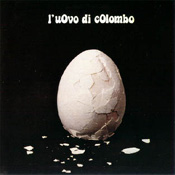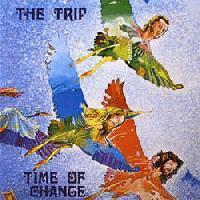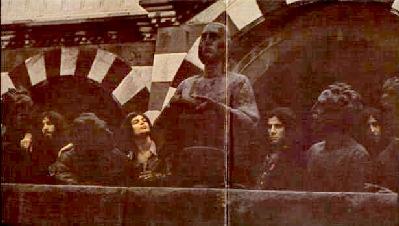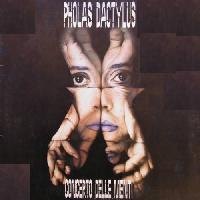 L’Uovo
di Colombo was one of the most accomplished Itaprog bands, but also one
of the most obscure. The name,
I have been told, refers to Christopher Columbus and accurately produces an Italian idiom that
is roughly translatable as “plain as a pikestaff”. The eponymous
album came out in 1973 and featured a keyboard sound, dominated by organ,
over an especially tight and professional-sounding bass and drum rhythm
section. The bass player came from Flea and would return to that line-up
under its Etna moniker. The drummer came from the forerunners of Reale
Accademia di Musica and went on to join Samadhi.
The compositions are all quite progressive in terms of their musical vocabulary
and their contrasting sections, in addition to being consistently energetic.
They all appear to be cut from the same cloth, the effect being something
like easy listening for prog devotees, although none of them contain anything
trite. The format is much more progressive, for example, than Reale Accademia
di Musica, but the tension that pervades the Accademia’s music is
lacking, so it is difficult to decide who is more prog and who more pop.
The singer is relatively unobtrusive and unpretentious, and there are
some supportive backing vocals as well.
L’Uovo
di Colombo was one of the most accomplished Itaprog bands, but also one
of the most obscure. The name,
I have been told, refers to Christopher Columbus and accurately produces an Italian idiom that
is roughly translatable as “plain as a pikestaff”. The eponymous
album came out in 1973 and featured a keyboard sound, dominated by organ,
over an especially tight and professional-sounding bass and drum rhythm
section. The bass player came from Flea and would return to that line-up
under its Etna moniker. The drummer came from the forerunners of Reale
Accademia di Musica and went on to join Samadhi.
The compositions are all quite progressive in terms of their musical vocabulary
and their contrasting sections, in addition to being consistently energetic.
They all appear to be cut from the same cloth, the effect being something
like easy listening for prog devotees, although none of them contain anything
trite. The format is much more progressive, for example, than Reale Accademia
di Musica, but the tension that pervades the Accademia’s music is
lacking, so it is difficult to decide who is more prog and who more pop.
The singer is relatively unobtrusive and unpretentious, and there are
some supportive backing vocals as well.
 The
Trip are in danger of being left out altogether, despite being one of the
most popular rock acts of the early seventies in Italy, as well as an
important catalyst of the Itaprog movement. The problem is that when in
1972 they became genuinely progressive, they were no longer in the vanguard.
Much more interesting than Atlantide (1972), therefore, is Caronte
(1971). Still more rudimentary, their eponymous album of 1970 is often underrated
despite its historical importance. By 1973 they were no longer recording
for RCA, but were able to put Time Of Change out on the Trident label.
This is ambitious progrock from start to finish, absorbing heavy doses of
other styles that are intensely focused – most notably the postwar
American (also Franco-American) jazz-classical style in “Rhapsodia”,
which comprises side 1. On the second side there are four tracks and greater
variety. “Corale” is especially nice. As customary with
The Trip, the vocals are in English. Most titles on the album are actually
in Latin language, but “Corale” is an Italian title. With English
lyrics and Italian title, this tune surely harks back to the first Trip
album. But its mind-boggling lyrics and sophisticated counterpoint and syncopations
are astonishing for what is basically a set tune.
The
Trip are in danger of being left out altogether, despite being one of the
most popular rock acts of the early seventies in Italy, as well as an
important catalyst of the Itaprog movement. The problem is that when in
1972 they became genuinely progressive, they were no longer in the vanguard.
Much more interesting than Atlantide (1972), therefore, is Caronte
(1971). Still more rudimentary, their eponymous album of 1970 is often underrated
despite its historical importance. By 1973 they were no longer recording
for RCA, but were able to put Time Of Change out on the Trident label.
This is ambitious progrock from start to finish, absorbing heavy doses of
other styles that are intensely focused – most notably the postwar
American (also Franco-American) jazz-classical style in “Rhapsodia”,
which comprises side 1. On the second side there are four tracks and greater
variety. “Corale” is especially nice. As customary with
The Trip, the vocals are in English. Most titles on the album are actually
in Latin language, but “Corale” is an Italian title. With English
lyrics and Italian title, this tune surely harks back to the first Trip
album. But its mind-boggling lyrics and sophisticated counterpoint and syncopations
are astonishing for what is basically a set tune. The Teoremi
LP of 1972 is one of the dearest items on the Itaprog vintage market,
fetching prices approaching $1K. Musically it starts slow, and only with perseverence
will the listener conclude that it is fundamental. Maybe it’s
just that the first track is intellectually complex. Overall the album is
Itaprog, and not hard rock as might at first appear. The first
side does not really fit comfortably into any genre, unless something in
the way of the Biglietto Per L’inferno disc of 1974. Yet there is thematic
development, a useful drum solo, and a bracing conclusion. On the second
side comparisons with Jumbo become possible, but this music is more challenging technically.
The album
has an instrumental feel overall, yet the vocals are disciplined
and the incidental choral arrangements are good. The guitarist, highly competent and
a driving force, sticks to the hard line and merely has his moments on this record. But the bass player,
who reappears on Samadhi, was among the finest.
The Teoremi
LP of 1972 is one of the dearest items on the Itaprog vintage market,
fetching prices approaching $1K. Musically it starts slow, and only with perseverence
will the listener conclude that it is fundamental. Maybe it’s
just that the first track is intellectually complex. Overall the album is
Itaprog, and not hard rock as might at first appear. The first
side does not really fit comfortably into any genre, unless something in
the way of the Biglietto Per L’inferno disc of 1974. Yet there is thematic
development, a useful drum solo, and a bracing conclusion. On the second
side comparisons with Jumbo become possible, but this music is more challenging technically.
The album
has an instrumental feel overall, yet the vocals are disciplined
and the incidental choral arrangements are good. The guitarist, highly competent and
a driving force, sticks to the hard line and merely has his moments on this record. But the bass player,
who reappears on Samadhi, was among the finest. Earlier we looked
at Città Frontale, which took its name from the never-recorded Osanna
precursor band, yet raised itself for the second time from the veritable
ashes of the classic Osanna lineup. The other direct Osanna offshoot was
Uno, supposedly comprising the cream of Osanna (esp. guitarist Danilo Rustici
and saxophonist Elio D’Anna), a much-publicized trio who went to England
and recorded in 1974. The Uno record has its flaws. The opening tune
steals surreptitiously and ineptly – though maybe also poignantly –
from Elvis Presley’s timeless “I Can’t Help Falling In Love
With You”. Next is “Popular Girl”, track 2, midway through
which you begin to wonder whether this is progressive, a question not immediately
answered. “I Cani E La Volpe”, track 3, is certainly melodic enough
to fall into the Itaprog tradition, and gradually the Uno sound begins to
settle in. “Stay With Me” caps side 1 and shows that Uno
is developing an unusual amalgam of the Italian rock aesthetic with some
of the popular British artrock forms of this time (e.g. Pink Floyd, Queen,
Man, Caravan), while somehow managing to transcend precedents. Uno puts
their formula through its paces on side 2, especially in “Uno Nel Tutto”,
and there is something very honest about the presentation.
Earlier we looked
at Città Frontale, which took its name from the never-recorded Osanna
precursor band, yet raised itself for the second time from the veritable
ashes of the classic Osanna lineup. The other direct Osanna offshoot was
Uno, supposedly comprising the cream of Osanna (esp. guitarist Danilo Rustici
and saxophonist Elio D’Anna), a much-publicized trio who went to England
and recorded in 1974. The Uno record has its flaws. The opening tune
steals surreptitiously and ineptly – though maybe also poignantly –
from Elvis Presley’s timeless “I Can’t Help Falling In Love
With You”. Next is “Popular Girl”, track 2, midway through
which you begin to wonder whether this is progressive, a question not immediately
answered. “I Cani E La Volpe”, track 3, is certainly melodic enough
to fall into the Itaprog tradition, and gradually the Uno sound begins to
settle in. “Stay With Me” caps side 1 and shows that Uno
is developing an unusual amalgam of the Italian rock aesthetic with some
of the popular British artrock forms of this time (e.g. Pink Floyd, Queen,
Man, Caravan), while somehow managing to transcend precedents. Uno puts
their formula through its paces on side 2, especially in “Uno Nel Tutto”,
and there is something very honest about the presentation. Concerto
Delle Menti by Pholas Dactylus came out in 1973 on the Magma progressive
label. One’s first impression is that it is a trifle ‘over the
top’ and therefore cannot be placed alongside the gems of the Itaprog.
Continuous throughout, and mainly instrumental, it begins with extensive
declamation from a stage voice, first as a soliliquy, then as an instrument
in concert with rock quartet. Those early passages seem somewhat unskilled
– not especially well in tune, and of primitive sound quality. Yet
the music develops from there, passing through sections that at times
appear overstructured, and later, always with a sense of a musical progression,
passing into complete improvisation, and, as the declamatory voice returns,
into laid-back jam, while the excellence of the sound production becomes
more evident. In contrast to the exploratory journey of side 1, the second
side has the format already established and proceeds to create music in
that genre, as it were. Registering at the avant-garde end of the progressive
scale, Concerto Delle Menti is not the flawed outing of a one-shot
rock’n’roll wannabe. It is a somewhat introverted but highly
authentic Itaprog product. The key to appreciating it will fit most of the
Itaprog confraternita – yet another obscure classic recording
of Italian progressive rock of the 70s.
Concerto
Delle Menti by Pholas Dactylus came out in 1973 on the Magma progressive
label. One’s first impression is that it is a trifle ‘over the
top’ and therefore cannot be placed alongside the gems of the Itaprog.
Continuous throughout, and mainly instrumental, it begins with extensive
declamation from a stage voice, first as a soliliquy, then as an instrument
in concert with rock quartet. Those early passages seem somewhat unskilled
– not especially well in tune, and of primitive sound quality. Yet
the music develops from there, passing through sections that at times
appear overstructured, and later, always with a sense of a musical progression,
passing into complete improvisation, and, as the declamatory voice returns,
into laid-back jam, while the excellence of the sound production becomes
more evident. In contrast to the exploratory journey of side 1, the second
side has the format already established and proceeds to create music in
that genre, as it were. Registering at the avant-garde end of the progressive
scale, Concerto Delle Menti is not the flawed outing of a one-shot
rock’n’roll wannabe. It is a somewhat introverted but highly
authentic Itaprog product. The key to appreciating it will fit most of the
Itaprog confraternita – yet another obscure classic recording
of Italian progressive rock of the 70s.